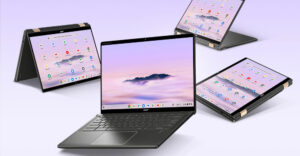
The new president-elect for the U.S. isn’t even in office yet and he is already wrapped in scandal. Fortunately we can live with this one as it had to do with whether he carried a Zune or an iPod, but given some were calling this — and I’m not kidding — “Zunegate,” I thought the event was interesting.
But it did showcase how closely we are watching the guy and probably did more for Zune, significantly more, than every penny Microsoft has spent marketing the platform. Obama strikes me as a function over form guy and that got me thinking about Obama’s Apple laptop, and he may soon become the most powerful Mac advocate, and pain in Apple’s butt, on the planet.
In addition, I’m writing this from the annual EMC Analyst Conference and was fascinated about some of the discussions surrounding surviving the market downturn. One of their strategies is to help their clients deal with the “OMG Budget,” as in “Oh my god, I can’t possibly operate my department on this budget” and think it probably would be good to talk about how to deal with that this week.
We’ll close with my product of the week — batteries for your Mac or future HP that have four times the service life than you currently get.
Obama – the Mac Customer From Hell
When Steve Jobs came back to Apple, he shut down a number of practices to contain cost and save the company. He shut down the enterprise and government unit and, I think, unintentionally lost education as well.
As a result, Apple’s penetration in government and education cratered, even though a large number of teachers and professors tended to favor the platform. Now the new president-elect likes Macs, and I find it hard to believe that rank doesn’t come with the privilege of picking his own PC. If that is the case, he will become one of the most powerful advocates for Macs on the planet, and given he is driving a massive effort to fund and equip education, you would think Apple would have an inside track to that massive opportunity which could truly mainstream the product.
But the government has rules with regard to the companies it deals with. It requires prices close to vendor cost and compliance with security rules that may have been put in place for Windows machines, but apply to all PCs; and, once in place, the government doesn’t change rules easily or quickly. In fact, because Apple is a single vendor, even getting relief from any of these rules may be impossible because it would appear to disadvantage the other vendors potentially bidding for the business (and these other vendors are seldom silent on things like this).
Since Obama is a Mac fan and Apple was a big supporter, anything he does to help Apple would create the impression of impropriety, which suggests he would be advised, and likely comply with the advice, that Apple not be given an easier path.
But this doesn’t mean Apple can walk away from this business either because there would be a lot of eyes on how it approached the situation. If it looked — as is likely — like Apple was trying to profit excessively from the effort to upgrade the country (or particularly to supply children with current technology), well, it would make the Greenpeace stuff look trivial by comparison. In short, if the U.S. President wants Apple to step up, it will be incredibly difficult for Apple to say no, and government and education margins suck.
As a result, Obama may be the Apple fan from Hell, one that can dictate to Steve Jobs exactly what Apple has to supply and what price they are allowed to supply it for. It will be interesting to see the company, which operates on impressively high margins, dance this particular dance. Wouldn’t it be interesting if Steve had to sell his jet?
Dealing With the ‘OMG Budget’
Speaking about getting a budget that might force a CIO — or in the case of Steve, a CEO — to have to eliminate something he or she can’t live without, at the EMC analyst event last week, we spent a lot of time talking about the subject of dealing with an ugly budget. It amazes me how many companies, like John McCain during the debates, want to cut things across the board without thinking through the result. For a lot of things this can be really dangerous because, for instance, technology is often used to consolidate resources and to automate tasks that would otherwise require a lot of people to do. When someone cuts one of these systems, particularly while doing a layoff, you suddenly have what may be an unrecoverable problem because you both need more people to do the same job now and have fewer people than you had before to do it.
In addition, for organizations that operate in a very efficient fashion, this can be a nightmare scenario because they contribute to the pot at the same degree that large, bloated, inefficient organizations do. This actually awards inefficiency because the inefficient unit has headroom to lose, while the efficient one is already operating at minimums and may become non-viable after a major cut. In fact this is one of the executive games, to build up excessive staff so that, during a horizontal layoff, they can sacrifice people they didn’t really need in the first place.
What instead needs to happen is an analysis of the firm’s needs, resources, dependencies, and priorities. From this the things that aren’t critical can be cut and those that are will be left alone if the resulting recommendations are followed. This should help the firm make cost cuts more intelligently and, in some cases, actually buy technology offerings and services that increase efficiency and fund themselves on the savings. That’s what EMC appears to be setting up to do, to position its offerings to both help customers make informed decisions and to bolster the customer’s efforts to cut cost, increase efficiency and improve security. This last is because physical and electronic crimes are expected to increase vertically, and EMC is positioning RSA, its security subsidiary, against this threat.
There are ways to survive times like these; thinking through your decisions and using your head in general is one of the best.
Product of the Week: Boston Power Batteries
HP just signed a deal with Boston Power for batteries that are designed to last for 1,000 cycles, or effectively the life of a laptop computer. Typical batteries that are sold with a PC last for 250 cycles and generally wear out in a year. This is particularly problematic for many Apple products, which don’t have user replaceable batteries. And the firm already has a partner that sells its batteries as external enhancements for Macs.
Even with regular PCs, I find having to replace batteries incredibly annoying and think they should last for the reasonable life of the PC, particularly if they are built into the damn thing. Because this product fixes a problem I have, because it will be built into HP products in the future, and because it could make underpowered products like the MacBook Air useful, this product is my product of the week.
Rob Enderle is a TechNewsWorld columnist and the principal analyst for the Enderle Group, a consultancy that focuses on personal technology products and trends.




















































This article reflects a naive view of government procurement. The government has several different methods of purchasing things. In the case of a Blanket Purchasing Agreement or a GSA Schedule contract, the terms, conditions, and prices are pre-negotiated. Agencies can purchase things on these contracts by making a desktop comparison of three vendors and by justifying their choice. That justification has to be good, but it doesn’t have to be based on price. Then for very large procurements, there are Invitations for Bids, in which the award is based solely on price. This only works with commodities that are identical regardless of the source. Finally, there are Request for Proposals, in which the bidder has to write a technical proposal with pricing. The evaluation criteria are revealed to the bidders in advance and consist of a combination of factors, including price and features: say, uptime, physical size, and proposed user training. This procurement vehicle is designed to prevent the government from getting cheap crap.
Occasionally the system doesn’t work, but, cynicism aside, most of the time it does. This is why intelligence agencies and the US Army have a lot of Macs, and it is why the Army’s main web site (www.army.mil) runs on OS X servers. Check it in Netcraft.
Apple is in the enterprise (Axel Springer Verlag and Google are the largest customers) and in government (such as the US Army). Apple just doesn’t crow about it.
"Obama strikes me as a function over form guy…"
If you really believe that, I feel safe in completely ignoring anything you say from now on, Mr. Zune-derle.
The election of Barack Obama is the ULTIMATE triumph of form over function. For proof, look no further than the designer logo for "The Office of the President-Elect," which is a creation of his graphics department, not an actual government entity.
The President-Elect’s politics — the ones that anyone has been able to pin him down on — are thoroughly conventional big-government liberal. His appointments so far suggest that his administration will be characterized by "change" that consists of going back about eight years.
Obama is the Mac Cube of politics: "It’s pretty…but what does it do? And why does it cost so much?"